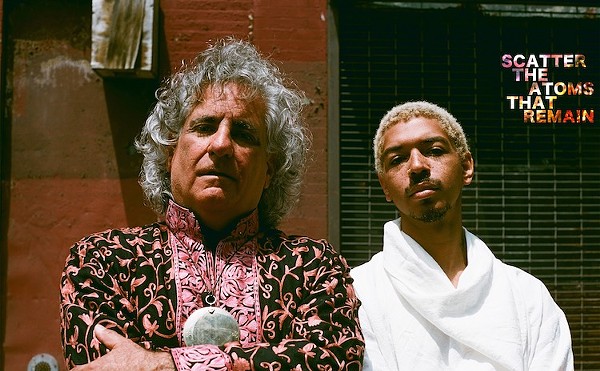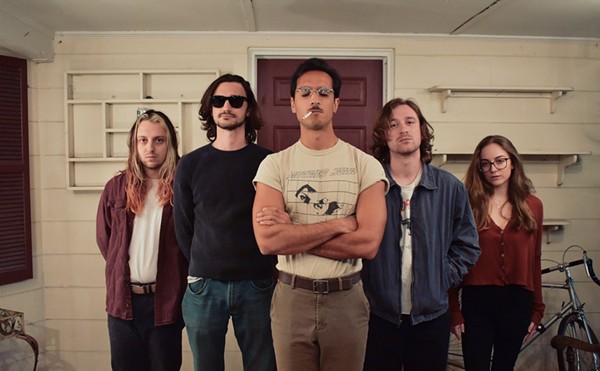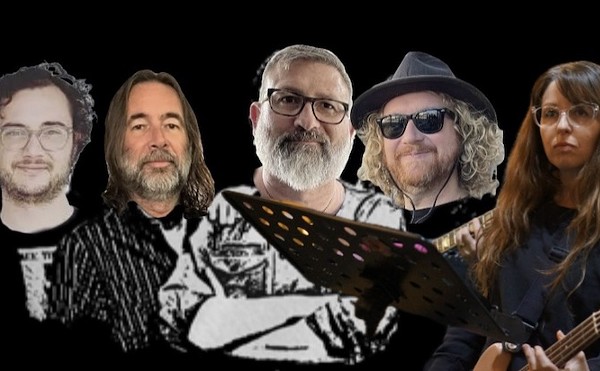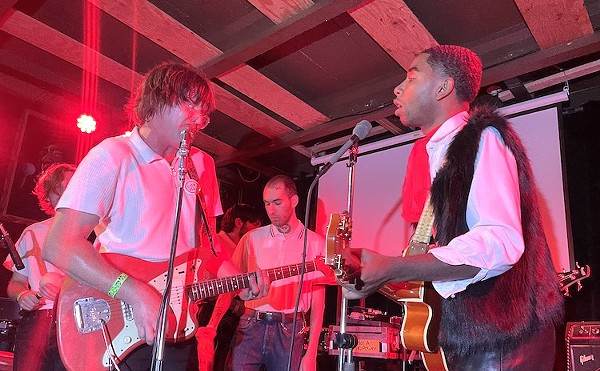Rob Mazurek is in with the in crowd. Although he'd been a working musician in Chicago for more than a decade, mostly playing in hard-bop jazz bands, Mazurek didn't start really making the scene until about five years ago when he met guitarist Jeff Parker (a member of Tortoise as well as about a half-dozen other bands) and the pair formed the Chicago Underground Orchestra.
Since then, the 35-year-old cornetist has enjoyed great successes and a busy schedule as a ringleader and active participant in the more adventurous side of the Windy City's music community. In addition to recording five albums under the Chicago Underground banner and three as a co-leader (along with Parker and others) of the group Isotope 217, Mazurek has played and recorded with Tortoise, Gastr del Sol, Jim O'Rourke, Brokeback, Sam Prekop and Stereolab.
While his career is flourishing, Mazurek's music is as well. Both his bands mix and match different sounds, styles and genres, and both tend to create collectively, with as much improvisation as composition. On its most recent release, "Who Stole the I-Walkman?" (Thrill Jockey), Isotope presents a pileup of modern music, incorporating electronics into jazz-rock fusion and tossing in elements of hip-hop and minimalism. Meanwhile, the Chicago Underground Trio and Duo, smaller offshoots of the original Chicago Underground Orchestra, have branched off from their progenitor's more traditional, organic jazz sound; electronic manipulations crept into "Synesthesia" (Thrill Jockey), the latest Duo album, release last August.
"One of the things that's similar in almost all the things I'm involved with: We like to try and hit as many elements of sound as possible," Mazurek says. "That makes the most interesting music."
But what makes the bands so impressive is Mazurek, a reluctant star who cites the musicians he plays with as his main influence and inspiration. He asserts that the players he has surrounded himself with are the reasons for his successes: "The more personalities you have, the more potential you have."
That's been the case for Mazurek, who maintains that he "sounded bad for a lot of years" before hooking up with the Tortoise community.
Part of the originality of his sound comes from his instrument itself. Although it has been all but banished from modern jazz in favor of the trumpet, the shorter, broader cornet boasts more mellow tones. Mazurek's masterful playing of the instrument is sometimes sublime, sometimes boisterous, and always marked by his ability to sustain and maintain long, graceful tones.
Conversely, his use of stops and mutes in the bell of his cornet allows him to experiment with the sound of the instrument itself. Mazurek says his "sculpting" of his sound with his hands has a lot to do with his interest in electronic music: "I'm trying, not to emulate electronic sounds, but emulate the cut-up texture of electronic music."
Even though Mazurek has the style and power to be a leader, some of his best work shows the benefit of working with another horn -- for example, his collaborations with trombonist Sara P. Smith on the first Chicago Underground Orchestra release, "Playground" (Delmark, 1998), and Isotope 217's debut, "The Unstable Molecule" (Thrill Jockey/New Beyond, 1997). Their chemistry is obvious on both discs as they cultivate a deep, brassy dialogue. Sadly, Smith had to leave both groups in 1998 because of a wrist injury.
"It was a very traumatic thing for her and a very traumatic thing for `the bands`," Mazurek says. "It took a very long time after she left for us to find our sound again. When she left we weren't even sure if we could continue."
Both units did continue, though Smith's departure shaped their paths. The Orchestra stopped performing, with Mazurek retaining the name for his duo and trio projects. Isotope 217 reduced itself to a quintet and rebounded strongly, experimenting more with sound and structure and incorporating the electronic experimentation now associated with the band. Isotope's second release, "Utonian Automatic" (Thrill Jockey), eschewed the slow, intoxicating funk of its debut and let the players' influences really show.
Because of the instrument lineup and its expansive, funky sound, Isotope 217 is often likened to Miles Davis' electric work of the 1960s and 1970s. Although Mazurek counts Davis' '70s experiments among his influences, he says he doesn't get the comparisons.
"I fucking listened to Miles, and he was my hero for years and years. But for the life of me, there's only like 2 percent of the music of Isotope that sounds remotely like Miles," he says. "I just don't understand."
While Isotope 217 presents an open-ended mix, the various Chicago Underground groups explore more subtle mélanges of style and substance, rooted in jazz. The sound of the Chicago Underground recordings isn't so much a band playing tunes as a rich discussion between the instruments. Mazurek has worked with drummer Chad Taylor as the Chicago Underground Duo and, with the addition of bassist Noel Kupersmith, as the Chicago Underground Trio. The most recent Trio CD, "Flamethrower" (Delmark), includes guitarist Parker as a way to explore different trio combinations.
In his pursuit of ever more sound possibilities, Mazurek has added his laptop computer to the process, allowing him to weave in subtle electronic elements. (He is scheduled to release a CD this year of experimental electronic music under the guise of Orton Socket.) It's this desire to experiment that typifies the process of his bands.
"Nothing we do in Isotope or the Duo hasn't been done before," Mazurek says. "But when you mix those sounds together, it's interesting."


















